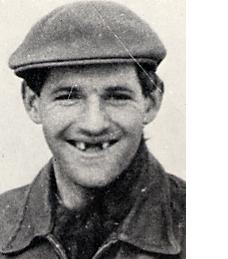By Jimper
The winter corn grew tall until the time came to combine it. All winter it had lay in neat rows awaiting the spring and that winter the river authority had been busy out on the marsh, clearing the rivers and ditches out and unknown to us, left something of theirs behind.
The sun that year ripened the corn. The contractor pulled into our farm one evening, ready to start on 180 acres of my corn. At nine next morning, I greeted George as he was greasing up the eight foot combine, and loaded it up with rolls of sacks, for in those days, we bagged all the corn on the combine and having filled five sacks, it was dropped to the ground down a shute, to be picked up later by me after we had finished for the day. I then had to take the tractor, load them all aboard and transfer them to the barn, where I untied the string from around the neck and rolled the top of the sack down so as to allow the corn to breathe and let any moisture out. Oh for the modern day with hydraulics and bulk loose corn.
In a Jam
I climbed aboard the, by then old, Massey and we crossed the home field that was in grass to the first of many acres of corn, through the gate and started to open the field up, taking a left out of the gate, alongside the ditch. One hundred yards on George gave a shout and stood up in surprise for twenty yards the corn ahead was moving in a strange way as if an earthquake had started to rock it. “What is it?” he shouted, thinking it must be a thousand rabbits, all heading our way at once. Then he noticed the elevator taking the corn from the cutter bar judder to a halt and the corn thrashing drum behind him gave a bang. All the V-belts screeched in protest as the whole machine jammed solid and the corn stopped moving. He stopped the engine and we got off to investigate the cause. There for all the world to see lay, or more to the point, wound, the problem. The Water Authority in the winter had obviously at some time changed fifty yards of half inch wire cable and pulling it off the excavator’s drum, left it lying there amid the green corn. There it lay unnoticed until now. George lay underneath the combine and opened up the stone trap into the thrashing drum. The verdict was not good. At least thirty turns of bristly wire wrapped neatly around and maybe the bars of the beater bent. There was no way of knowing until we freed it of all the straw and wire. All day we two lay under that bloody combine with rag wrapped around our hands, holding a hacksaw blade, sawing away at the wire. There was no room for the saw frame so had to use a naked blade. We got through thirty in the first day. What price now for an electric grinder but that could have set the whole lot alight. We did at one stage think of oxyacetylene and ruled it out. By midday on the following day, we had it all free but then the drum was found to be bent, so the machine was taken away to be repaired. If we had known, we could have saved a lot of hard work and time by just cutting the thirty yards still lying in the corn field and drive the tangle away for the mechanics to sort out, but George was not like that. Most things he could do himself and a mechanic cost money.
Meanwhile, as I waited six days for George to reappear with the combine, it rained and I mean rained! One inch of water fell in three days. The marsh ground was sodden and our other farm on the hills became more like winter. The springs that had only dribbled, now gushed water from the ends of the land drainage pipes. A wet harvest now lay ahead for me and many others.
We resumed the harvest that year on the hill as the marsh lay too wet. Up to the wire affair, the summer had been good, now winter set in six weeks early. Wind and rain flattened the corn. We took eight days to cut eighty acres and it broke my heart as I pulled the rope to let slide five or six sacks of corn from the combine to lay on the wet earth for the rest of the day until I could retrieve them that night. The marsh was too wet to take the weight of a combine and we had to leave it until we got a good hard frost in November when a neighbour brought his ancient reaper round and with a light tractor towing, we managed to salvage half of the barley and wheat.
Best Duck Shooting Season Ever That year I had some of the best duck shooting of my life as the fowl dropped into the flashes of water amid all the uncut barley. We turned our pigs out on to it for the winter but they hated the cold water and left the wettest places until last. Never again was I to leave it to George to come to me last. I booked him in mid-summer in future years.
From “Rye’s Own” March 2004
All articles, photographs, films and drawings on this web site are World Copyright Protected. No reproduction for publication without prior arrangement. (Hard Copy Back Numbers Still Available) © World Copyright 2016
